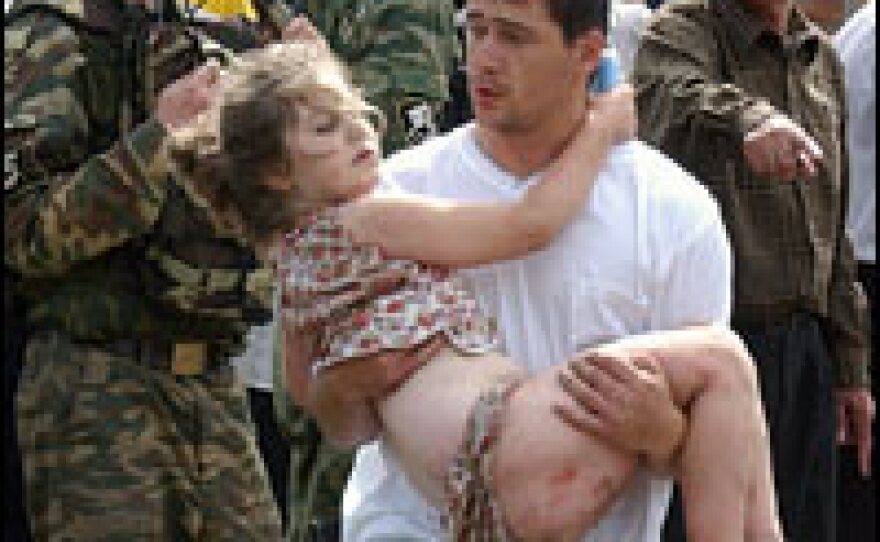

In September 2004, on the first day of class, Chechen militants took more than 1,200 hostages in a school in Beslan, Russia. After nearly three days, explosions and gunfire ripped through the school, leaving more than 300 hostages dead. Two years later, questions remain about what happened and why.
Each year, the Day of Knowledge -- or first day of school -- in Beslan, Russia, is a celebration. Students wear their best school uniforms -- blue and white dresses and suits. They bring flowers and candy to their teachers. Parents and grandparents accompany them to the old brick school building in the center of the small farm and factory town.
Pop music plays, speeches are made. Teachers promise it will be a good year. The stars of the show are the first-graders. They file in last.
On Sept. 1, 2004, emergency room doctor Larissa Mamitova was tired from working the night shift. Her son, Tamik, didn't like these assemblies, but she took him anyway. She promised to go buy him new pens and pencils and a backpack afterward.
Mamitova smiled and clapped to the music. Then she heard a noise.
"At first I thought, 'Oh, the kids are making fireworks. That's great!'" Mamitova says. "But then I saw men with masks and camouflage. For a minute I thought it was a military exercise. After a few more minutes I realized it was a terror attack."
Amid screams and chaos, Mamitova searched for Tamik. Shots were fired and more than 1,200 were herded into the school. By the time Mamitova reached the hot and crowded gym, there was nowhere to sit. Tamik found her. She managed to squeeze him into a spot on the floor.
Militants confiscated phones and video cameras. They hollered out rules: No speaking until spoken to. Everyone must speak in Russian. One hostage, a father named Ruslan Betrozov, stood to calm people. He repeated the rules in the local language, Ossetian. A gunman approached and shot him in the head.
"There was a corpse," Larissa Mamitova remembers. "They made a girl clean up the blood. Somebody tapped me and said, 'They are looking for a doctor.' They led me down the corridor and showed me two wounded militants. I was putting a bandage on the second one, and I asked, 'Why are you doing this?'"
"'We want peace in Chechnya,' he explained. 'Our women are being raped. Our children are being killed.'
"'I told him, 'You should have taken the authorities hostage. Not kids.' He said, 'Doctor, if you only knew how we got here, you would be very surprised.'"
The Militants Had Help
Many of the militants were from the nearby Russian republic of Chechnya, which has waged a separatist war with Russia since 1994. Chechnya is one of many small Muslim republics in the south of Russia that sit at the foot of the mighty Caucasus mountain range. The school is located in the republic of North Ossetia -- the only majority Christian republic in the region.
Early on the morning of Sept. 1, 2004, the militants, or boyviki as they are known in Russia, were camped in the republic of Ingushetia, situated in between Chechnya and North Ossetia. They left their camp in a Russian military truck.
Ingushetia and North Ossetia don't get along. They went to war with each other in the early 1990s. That plus the war in Chechnya means this region is violent and unstable. All the roads have armed checkpoints.
It's been said that the boyviki bribed their way through these checkpoints to reach the school that day. But locals tell a different story.
After leaving the camp, the boyviki took back roads through the woods and stopped in the tiny village of Xhurikau. They were stopped by a local policeman. They kidnapped him and drove on. Normally, the road out of the village was closed -- gated off and blocked by deep trenches. But that day it was open, says the policeman's nephew, Ali, who tried to follow the militants' truck that day. Somehow, the road had been fixed.
Adam Dolnik has spent much of the last two years studying the Beslan siege. He trains hostage negotiators around the world on how to avoid such an outcome. He said it's likely the militants pre-arranged their trip to Beslan with local officials.
"They were allowed to camp unmolested in the woods of Ingushetia for two weeks," Dolnik says. "They were allowed to drive dirt roads out of the woods and bypass checkpoints, and, possibly, they prearranged their route with someone who had the power to fix that road."
'Your Son Will Be Killed'
That day, the boyviki reached Beslan in less than an hour and quickly took control of the school. News traveled fast through town. Officials announced that the militants had made no demands, and that there were only 120 hostages inside.
Hostage and doctor Larissa Mamitova heard the news on a radio inside the school.
"I suggested to the boyvik who I was bandaging, 'Let me go outside and tell them your demands.' They took me to the library, and the colonel was there. He said, 'Sit down.' He gave me a piece of paper and said, 'Write this down.'"
The colonel told her to write that for every boyvik shot, they would kill 50 children. He said they wanted Russian troops to withdraw from Chechnya. He said he would only negotiate with four men -- Russian President Vladimir Putin, the presidents of Ingushetia and North Ossetia, and a pediatrician who had negotiated with Chechen militants during an early hostage takeover, at a theater in Moscow in 2002.
Mamitova took the note outside. "[The militants] told me, ' Come right back. If you take one step out of the gate, your son will be killed.' A man was running to me and I shouted in Ossetian, 'Don't believe the news! There are many more than 120 people in here!'"
Some Hostages Go Free
On the second day of the siege, people waiting outside the school were desperate for news. Officials upped the number of hostages to 354 -- still far below the actual number. This made the militants inside the school become much more cruel, says one hostage named Agunda, an 8th grader at the time.
"They said, 'No one needs you, nobody cares about you. They're not responding to our demands. We're going to kill you all." Then they stopped giving us water. And they didn't allow us to go to the bathroom."
Then, later that afternoon, the militants changed completely. They seemed excited, Mamitova says. "They said, 'Wait, a big person is coming. Cam down and make room for him.'"
That "big person" was Ruslan Aushev, the former president of Ingushetia, a well-known local politician who now works in Moscow. He entered the gym and greeted the hostages.
"I asked them if they recognized me, and they said, 'Yes,'" Aushev says in an interview in Moscow. Aushev says he was horrified at what he saw -- hundreds upon hundreds of desperate people packed into the hot and stuffy gym.
"I told them we would do everything possible to let them out."
Aushev says the militants were "confident and calm." He says they wanted him to restate their demand that the Russians withdraw from Chechnya. They gave him a note signed by Shamil Basayev, then the leader of the Chechen militants. It said that if Russian troops withdrew, Chechnya would remain an ally of Russia and militants would call a truce.
"We are offering you peace in exchange for security," the note said. "The choice is yours."
Aushev promised to take the note to officials. Then he asked the boyviki to release babies and nursing mothers. They agreed. In a haunting video made by the boyviki, Aushev quickly escorts the women and babies toward the door -- 26 people in all. The women thank the militants, and the militants tell them to thank Allah. The women and babies are whisked away in cars.
Aushev said he thought that a negotiated end to the standoff was difficult but possible.
"The thing I hoped for was that we would still be able to enter the school and get people out, that the federal authorities in Moscow would at least send a signal to pacify the boyviki," Aushev said.
When asked what kind of signal, he paused, and said: "Long, very patient negotiations."
'A Very Strong Fear'
Just after the release of the mothers and babies, hostages say they actually felt some hope.
Agunda, who was an 8th grader at the time, says it was the first time she allowed herself to cry. "I cried from happiness, because I began believing they would set us free."
But her hope soon disappeared. Sitting near her in the gym was a militant who had been negotiating with officials over the phone. His name was Ali, and he confided in Agunda and another hostage, Larissa Kudzeyeva.
"At first he would say, 'You will get everything you need -- food, water, everything -- as long as the government shows us they are willing to negotiate," Kudzeyeva says.
But late on the second day, after Aushev had arranged the hostage release, Ali came and said Russian officials refused to negotiate with terrorists. He slumped to the ground and stared at the floor -- like a man lost, Kudzeyeva says.
"This was the moment when I understood what the word mondrage means," Kudzeyeva says. "Mondrage is a very strong fear. Out of the blue, you feel so cold that your teeth chatter and you have no control of yourself."
A Violent Ending
By the third morning of the siege, with no substantive negotiations under way, the situation inside the school was grave. Hostages were on their third day with no food, their second day with no water. Some children ate the petals of flowers for moisture. Some children drank their own urine. Some were on the verge of consciousness.
Outside the school, relatives of the hostages gathered around car radios to hear the latest developments.
Then, just after 1:00 p.m., an explosion erupted in the school. Twenty-two seconds later, another. A huge column of smoke rose to the sky.
Hostages scrambled out of windows. Militants shot from inside the school. Soldiers and vigilantes shot back.
At first, Larissa Kudzeyeva didn't know what happened. All she could see was black smoke. The roof of the gym caught fire. One militant ordered Kudzeyeva and her two children to follow him to the school cafeteria.
The ruins of the school still stand in the middle of Beslan. There, Kudzeyeva demonstrated how she had to step over bodies on the way to the cafeteria, where militants were waging an all-out battle with soldiers outside. Bullets flew from every direction. Soldiers fired a tank. Militants threw and fired grenades. They ordered women and children to stand in the windows.
Eventually, Russian special forces climbed into the cafeteria. One Militant threw two grenades. Kudzeyeva nearly lost consciousness. All she remembers is her daughter's voice, saying, "Take my mother away. She's alive, she's alive."
Questions Linger in Beslan
To this day, no one knows for sure which side ignited that first explosion -- or whether it was set off accidentally. In Beslan, there are many unanswered questions.
At a trial of the only militant to be captured alive, survivors and relatives of the dead tell the accused they'll tear him to pieces. But they also yell at generals and colonels:
Why did authorities use such heavy weaponry while children were still inside the school? Why didn't they try to negotiate a nonviolent end to the siege?
Two trials and three investigations later, no high-ranking Russian official has been held responsible for mishandling the siege. Those directly in charge have been reassigned or promoted.
They have built a new school in Beslan. It has a huge new playground and two swimming pools. Armed guards man the doors.
Survivors like Kudzeyeva are recovering. After more than a dozen operations to rebuild the part of her face that was blown off by the grenade, she still manages to offer her first drink of the day to God.
Kudzeyeva regained consciousness the day after she was rescued -- Sept. 4, 2004. The doctor asked, "When is your birthday?" Larissa told her. May 14th.
"No, forget it," the doctor said. "Your birthday is today. Welcome back from the dead."
Kelly McEvers is a freelance writer and radio producer who has covered the Caucasus region since 2004. She is a founding editor of the online magazine www.SixBillion.org.
Copyright 2022 NPR. To see more, visit https://www.npr.org. 9(MDAzMjM2NDYzMDEyMzc1Njk5NjAxNzY3OQ001))






